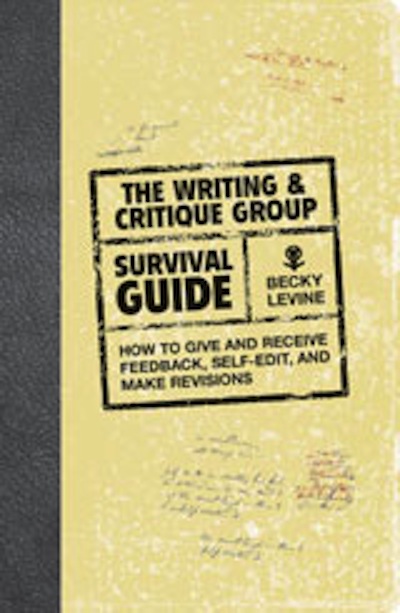I am so happy to have Becky Levine here today as my guest hostess. Becky offers great insight on the writing process. Did you know she wrote a book about the critique process? Enter THE WRITING & CRITIQUE GROUP SURVIVAL GUIDE: How to Give and Receive Feedback, Self-Edit, and Make Revisions. If you’re looking for a book to help you get your writing to the next level, this is a GREAT choice. (In the interest of self-disclosure, I won Becky’s book on the fabulous Shrinking Violet Promotions blog. Thank you to The Shrinking Violets and Becky! I should also mention, Becky is a friend and invaluable critiquer. I’m here to tell you, Becky talks the talk AND she walks the walk. Becky KNOWS critiques.)
THE WRITING & CRITIQUE GROUP SURVIVAL GUIDE is easy to read and filled with good examples. I’m telling you, this book will help you get more out of the critique process so you can improve your writing. This will get you beyond the fear of critiques to structuring and working on your entire manuscript–we’re talking about plot, dialogue, pacing, setting, voice, POV–through the details and the big picture. Whether you’re thinking of joining a critique group or have experience, you will find something that will get you thinking, developing your internal editor, and finish revisions. And isn’t that what we want to do?
I bet you’d like to read Becky’s post now, wouldn’t you? Please welcome Becky Levine!

Support.
Support in a critique group might seem obvious. Yes, it’s about listening to each other whine discuss the latest problems in our manuscripts. Yes, it’s about leaning on each other when we get rejection letters. Yes, it’s about calling up our local bookstores and libraries and making sure they have our critique partner’s books on the shelves.
It’s about a lot of other things, too, though. And sometimes, we all need a little reminder about what those things are.
You are supporting your critique partner when you:
- Take the time and energy to give detailed feedback about their project. Give them a clear explanation, point to examples in their manuscript, and make suggestions about specific changes they might want to make.
- Don’t ignore that bland dialog or inconsistent characterization that is bothering you. It’s bothering them, too, believe me. They just don’t know what to do about it yet.
- Help them brainstorm through a plot problem or two. Schedule time to bounce ideas back & forth about their hero’s character development.
- Read multiple revisions of their manuscript. Who’s going to get it all right the first time through? Or the second?
- Say “yes,” when they ask if you can read longer chunks of their book, even the full manuscript. Work out with them and the rest of the group how much time everyone will need, then schedule it out. When you read more pages at a time, you can provide a stronger critique in terms of consistency, plot tension, and character change.
- Make your commitment to critiquing their work strong and steady. Put critiquing time on your calendar, put aside dedicated time for reading and thinking, and deliver your critiques on time and with as much clarity as possible.
Does all this sounds like a lot? It is. Take another look at the list, though, and switch around some pronouns. Put your critique partner in the place of the one doing the work, and drop yourself into the recipient’s chair. Look at everything you’re getting back.
This is the strength of a strong, supportive group. Everything you put into the group, every minute of critiquing you do, comes back full circle to help you. Not simply because your critique partners are doing the same for you, but because that commitment and energy build something powerful, something that lets us grow our writing community and our writing craft.
 Bio
Bio
Becky Levine is the author of The Writing & Critique Group Survival Guide: How to Give and Receive Feedback, Self-Edit, and Make Revisions. Becky has participated in her own critique groups for fifteen years and has ten years experience as a freelance manuscript editor. She writes fiction and nonfiction for children and teens, as well as freelance articles and book reviews. Becky’s online class Mastering the Art of Group and Self-Critiquing starts at the new Writer’s Digest University on May 6, 2010.




 RSS
RSS Twitter
Twitter GoodReads
GoodReads
Thanks for inviting me to post, Vivian. 🙂
*waves hands in the air* Ooo, enter me! I love critique groups, and love Becky, and this sounds like an excellent source!
I want it I want it I want it.My fledgling critique group is meeting for the first time in May. We are all twisting our hands nervously, and would love to have a copy of your book to reference, Becky. I'm sure the other group members will want to buy their own copies after they see the one I WON… (Extortion! For shame! I know).
I already have this wonderful book, and even a review of it posted here: http://scribblersontheedge.com/category/book-review/But I would STILL love to be in the drawing because I know several writer friends I'd love to give it to.Great post, Becky! I loved the switching pronouns bit. It's a bit of a twist on "the way to have a friend is to be one." Only in this case, the way to have a great critique partner is to be one. Love it.Claudine
Wish I could attend a critique. I talk just fine with kids, it's the adults I'm afraid to say the wrong thing.Debbie Cavitt
Thanks for a great post, Becky – and thanks Vivian for having her here. You are both such inspirations!The critique process is hard – but oh so important. I'm lucky to have two great critique groups. I think the hardest thing is finding just the right way to help someone when a manuscript isn't quite there – but the reasons are not easy to define.
Becky and Vivian, thanks for all the supporting you do. It matters so much!I have the book, so no need to put me in the drawing. But I wanted to say hi and that I enjoyed the light shining!
Hey, 2 of my fave cyberpals on the same blog! I WANT THE BOOK, just so you know…Critiquing has always helped me to just keep swimming, to quote FINDING NEMO, so the accountability factor is big, but I also like getting feedback from multiple people on the same pages because you know something has to be dealt with if everyone's spitting out the same remark about it. I also must confess to feeling extreme irritation when crit partners feel a need to argue with me over my feedback – it's really not a good way to approach the process…
I'd love to enter.For me, the hardest part is finding a critique partner that I trust.
Hi Becky and Vivian!I bought the book and really loved it. It's already on loan to a buddy who is starting her own critique group. I appreciate all the good advice for all genres of writing. Well done, Becky. Anyone thinking about joining a critique group needs to read this.
Am I the only one who has problems FINDING (creating) a critique group? Maybe it's my trust issues or my perfectionist tendencies… But seriously, I'm dying to know how people come together so easily.
Great interview! I already have Becky's book, but maybe the most frustrating thing about a critique group is when it takes so long to get through an entire novel (depending on how the group is set up).
I already have Becky's book so you don't need to enter me. I think for me the most surprising thing about the critique process is finding that synergy with group members, getting to that point where you totally trust what they are saying, even when what they tell you is completely not what you were expecting.
Thanks for entering and sharing your critique comments. The contest is now closed. I'll post the winner later today…Enjoy your weekend!